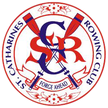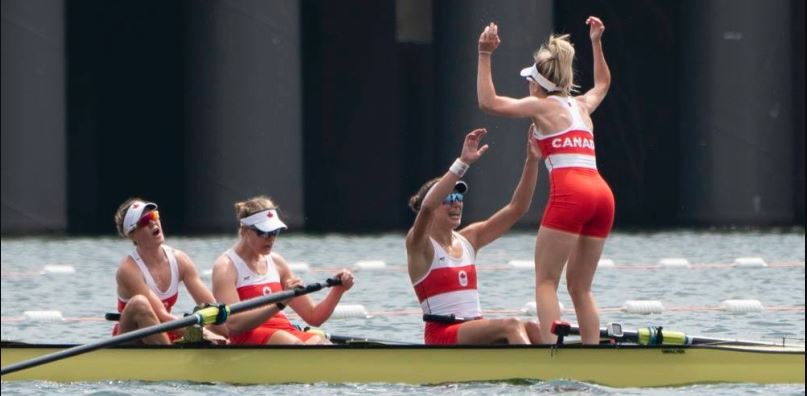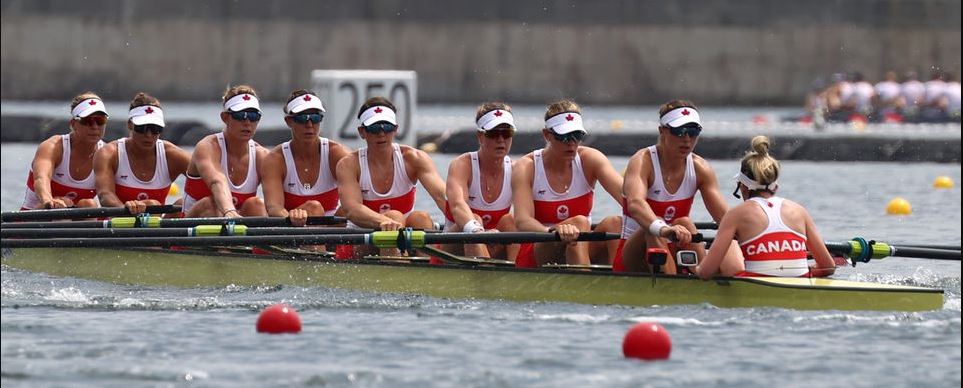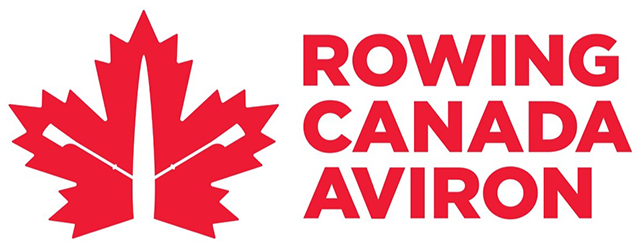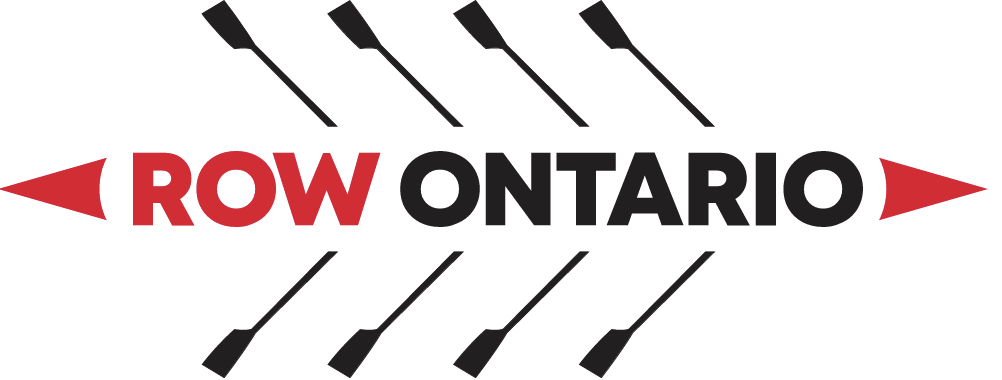|
Before the Tokyo Olympics, Kristen Kit was a household name in the St. Catharines Rowing Club community. Now, she needs no introduction. The newly crowned Olympic Champion coxed the women’s eight to a gold medal last week, succeeding in their intention to “redefine excellence”. I spoke with Kristen a week after the performance that dominated the race course, and had rowers and sports fans alike cheering all across Canada. Kit’s intentionality and awareness in the boat has transferred to her reflections on the race that will not be forgotten by Canadians anytime soon. What was the most notable moment of this whole experience, from qualifying to standing on the podium? We were a process-focused crew, and our coach Michelle Darvill made sure we remained true to that mentality. If I had to choose one moment, it would be crossing the finish line with those eight women, knowing that there were a lot of other people who helped us get there. We had a spare that came in quite late, and then her seat got taken back by Kasia after she healed from her injury. Our spare Becca Zimmerman was very selfless; she trained just as hard as anyone else and she obviously couldn’t race with us because there’s only 8 seats. Of course, our coach Michelle and Carol Love were both so integral to our crew, but they weren’t at the starting gates with us. When we crossed the finish line and won, it was about us, but also all the people that helped us get there. We were able to put down a performance that we were proud of and felt it represented all the people that worked us to get there.
You said in another interview that when you were locked in the starting gates you imagined that every person who has been a part of your rowing career was in the boat with you. What does it mean to you that you have also affected so many athletes throughout your career, especially now? Before I came on to the scene in the women’s 8+, there wasn’t a pathway for coxswains. You had to try and get past Leslie, and there was no one that was able to do that. Both Michelle Darvill and Al Morrow made space for me and other people when we started coming up. I’ve already had coxswains reach out to me saying that they saw the race, and they are now inspired to pursue the higher level of competition, and that’s amazing. It’s still going to be hard, but a pathway exists now. On a larger scale, rowing is an amateur sport, it’s not mainstream like soccer, and I hope that young boys and girls see a race like that and an opportunity to try it themselves. I hope that it helps rowing across Canada, both in keeping people involved in the sport, and trying it for the first time. Participation is not just about trying to go to the Olympics, but about increasing opportunities to experience the sport. Can you walk us through that last 1000m? It was so dominant, and the margin just kept improving. When did you know you had it? It wasn’t the last three strokes that I knew we were going to win. We had been rowed through for the first two races of the week, first by the Kiwis in the last 10 strokes. Romania had a fantastic sprint in the other race, and even though we were on pace for a world record, they walked through us. So the threat of being walked through was very clear in our minds and I didn’t trust it until the last three strokes. That being said, I always knew that we could do it. We had been going really fast all year, and with the speeds that I was seeing, it was clearly the fastest boat I had ever been in. The culture of the group was quite good. I knew that if we had our best race we could do it. Can you talk a bit more about your team’s goal to “redefine excellence”? We had a really neat situation when we came back from the initial COVID lockdown in July 2020. We were very fortunate to have the opportunity to train, and our coach Michelle was very big on culture and developing her rowers not just as athletes but as people. This group was quite tight, all 17 of us, some of whom ended up in the 4. Our 8+ came up with the idea that we wanted to not just be the fastest women’s eight at the Olympics, but ever. We got pretty close to it, we didn’t quite get to that, but we got close. We wanted to redefine the event and the boat class for Canada, and do something that people had never done before. Winning wasn’t our goal. Our goal was to go beyond that and have the absolute best race we, or anyone else, had ever had. That being said, we were at the Olympic Games, which is an outcome driven event, so it could have been easy to get away from that goal. But I think we raced well because we focused on the process, and every woman was trying to take her best stroke at the moment. For us that meant redefining what that meant for us individually and as a crew. We wanted to redefine what a women’s crew could do, redefine what a women’s eight could look like, and it was both for us, Canada and the world.
Who was the first person outside of the crew and team that you shared this moment with? After the media session, I remember being perched up against a concrete wall, and our coach Michelle came up to give me some food and water because I hadn’t really eaten yet. We facetimed Carol and that was a moment I got to sit with my two coaches and run through the race; that was pretty special. COVID protocols dictated that we couldn’t really share the moment with many people. I am so grateful that the Japanese opened their country to us. We were pretty much in a rowing lockdown for a month: masks, N95s, we weren’t allowed to venture off on our own. We certainly shared the moment as a crew, but we didn’t even get to see our coach until after the medal ceremony. We saw her on land, but we didn’t get to meet up with her for about an hour after the race. When everything was over, I did call Carol Love, who had worked with us extensively as well. She had come out at the end of January until June. She had a great impact on us, as she stroked the first women’s eight for Canada when women were allowed to compete in the Olympics for the first time in 1976. It was a very full circle moment to have her with us. She was very hard on us, because she believed in us. I remember one time she came up to us after a race this spring and when we were debriefing, she told us, “You know, we were doing these numbers in 1976. You can’t do this anymore. You are better athletes, you have stronger equipment and training than we did. You have to find it within yourselves to be better than this”. She was a really big part of this process. What was the most difficult part, individually and as a team, in preparing for the Games? COVID. We all had to get over that hurdle. We were very fortunate to race, I can’t say it enough that the Japanese were so kind to welcome us in the midst of a pandemic. We were grateful to just get to race, and it could have been called off at any time. As soon as we got back together, there were new challenges to face. But these women always saw them as solvable problems, and that made us much more resilient as a boat. For example, on July 23, we found out that our heat was being pushed up to the next day because a typhoon was coming in. Such a change might have messed with other crews heads: we had just done pieces, we weren’t in a day-before-race-day mentality necessarily yet; it was a significant change. Everyone said that these sorts of situations had been popping up for the last eighteen months, and we were ready to race. We learned that it doesn’t have to be perfect, you just have to be present. How did you prepare yourself to be the best leader you could be? Something that I was very focused on was being the best coxswain for the crew. It’s not about me, but about what the rowers and the coach needs. A large part of my process was checking in with the women, getting the calls they needed to hear, checking in with Michelle and watching video. We also used a lot of sports science to look at how specific calls were making the boat go faster. On a more personal level, I was trying to be very present. As a coxswain, you have to always be thinking two steps ahead, while staying in the moment. As we got into racing, I was very committed to being sharp and reading situations that gave my crew the best possible advantage. For example, it was still somewhat chaotic despite it being a regatta of smaller size. There was some bounce in the water, and every coxswain is always looking for the best water in which to do their warmups. Looking back, there were alot of times where if I wasn’t on top of my game, the crew could have been a little rattled. But they trusted me to get them through that situation.
What’s next for you? I’m an avid cyclist, so I’m going to do some mountain biking and see some friends. We were under strict COVID protocols since last winter, I didn’t go for Christmas this past year. So I’m going to do the things I haven’t done for the past, well, 12 years. I’m part of the RBC Olympians program, and last year I suffered a concussion. They were incredibly supportive, they continued my funding, offered resources, and even had individuals reach out personally. I have some RBC talks coming up soon which I’m looking forward to. Overall, I am really enjoying what we accomplished. I’m feeling very happy and grateful to my crew for trusting me and to my coaches for giving me that opportunity. I’m open to continuing, but I’m not sure yet what I’m going to do. This week has been a lot of media sessions. It’s been great to share our story, because the more people hear about it, the more people are hopefully inspired to try rowing, or at the very least, think “why not me?”. I’m just an average kid from St. Catharines, I didn’t have a huge sporting family growing up, and it was really a question of me seeing what’s available. Even though it was a 1% chance, I asked myself, “why not me?”. So I just really hope that other people are able to learn that lesson. It can be for school, career, or their personal life. It’s great to be able to share bits and pieces of our story with everyone. AuthorLauren Kelly is the director of Social Media for the St. Catharines Rowing Club and in her senior year at the University of Notre Dame. She is majoring in history and is a captain of the rowing team. Her debt of gratitude to the St. Catharines Rowing is very slowly being repaid through her efforts on the club's social media. Comments are closed.
|
St. Catharines Rowing ClubThe St. Catharines Rowing Club has a long tradition of competing at the highest level in the sport of rowing. Categories
All
Archives
November 2023
|
Please Support Our Sponsors
SIGNATURE
PLATINUM
GOLD
SILVER
BRONZE
© 2014, St. Catharines Rowing Club
St. Catharines Rowing Club, P.O. Box 28010, 600 Ontario St., St. Catharines, ON, L2N 7P8.
St. Catharines Rowing Club, P.O. Box 28010, 600 Ontario St., St. Catharines, ON, L2N 7P8.
